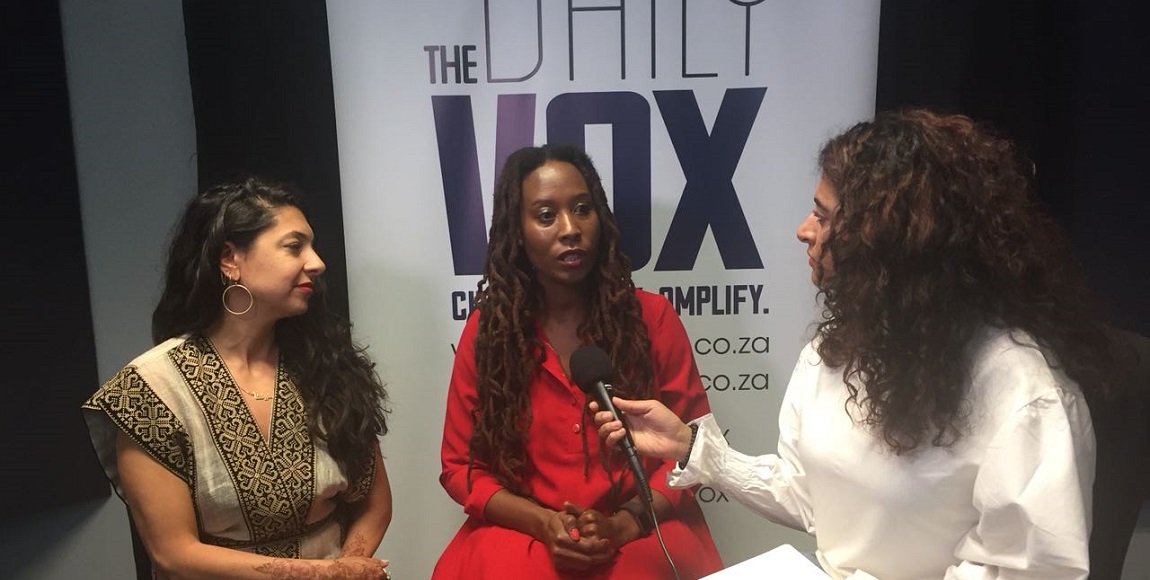
“We have to speak about our solidarity with the people of Palestine. It is urgent and it is important,” South African poet and writer Natalia Molebatsi said in a Facebook live interview with The Daily Vox on Thursday, 01 March. We sat down with Molebatsi and Syrian-American journalist, poet, and scholar Dr Maytha Alhassen to speak about Malcolm X, Afro-Palestinian solidarity, and the intersection of our identities.
The two spoke at an event at Wits University on Thursday night as part of the build-up to Israeli Apartheid Week (IAW) set to take place from the 12 to 18 March this year.
The theme for IAW is Afro-Palestinian solidarity. It will focus on Israel’s apartheid policies against the Palestinians as its discriminatory policies against Africans. The campaign also aims to focus on the African community in Palestine, to celebrate the historic support and solidarity that African liberation struggles and countries received from the Palestinian Liberation Organisation and Palestinian people during the 1970s and 1980s.
There is also a long history of the black resistance movement in the United States standing with the cause of Palestinian liberation, linking their shared experience of oppression and resistance against European colonialism.
“Malcolm X was a supporter of Palestine and criticised Zionism. He did take a trip to Gaza that shifted his analysis on Zionism and on the struggle for liberation on behalf of the Palestinian people and he wrote op-eds critiquing Zionism. There are people who have found those op-eds and hold that with them in terms of their defence of their support of the Palestinian people,” Alhassen said.
Molebatsi spoke about the intersection of Malcolm X’s identities and why he remains relevant in present day struggles. “Malcolm X is a Pan-African because we also realise that we are invoking spirits and as African people we honour the dead because we honour spirits. The fact that we’re talking about him means he’s not dead, but his teachings and his work is very much alive and it gives us the opportunity to teach it to our children,” she said.
“As a Pan-Africanist he acknowledged that Africa is a very important space for African-Americans. It’s a space to back to not only physically but spiritually and politically. As a Muslim person, he has a multiple space that he occupies because we have a lot of Muslims on the African continent. They have got a space that they acknowledge as being African, being black, and also being Muslim. You can see a space that is very intertwined and intersectional and important and complex and fun,” Molebatsi said.
Alhassen spoke on the connection between the struggles that Arabs are facing today and the struggles that African people have been facing. “On behalf of Arabs, I want to remind us that the struggle that we face has always and continues to be faced by African people. Stokely Carmichael used to call the Middle East North East Africa and that’s actually how I see us connected to our African brothers and sisters.”
Molebatsi said traveling to Palestine showed her the glaring similarities between apartheid South Africa and the apartheid faced by the Palestinian people. “As a black woman in South Africa who grew up in the 80s in the township under the apartheid occupation, when I went to Palestine a few years ago it almost like it was taking me back to my own childhood,” she said.
“The kind of compassion that the Palestinian people have is almost like they’re not occupied and it reminded me of the people I come from – very compassionate, very conscious, very aware of their place in this world as freedom fighters. They are welcoming people who will give you a teaching of where they are. It reminded me of South Africa in the 80s where it looked like we would never topple this monster of apartheid. But we did. This is the kind of thing I saw in Palestine with all the raids, and military and checkpoints – these people know that their freedom will come,” she said.
“If we do not have that kind of solidarity to say as South Africans: if we do not speak and affirm Palestinian people that they’re there and that they exist and that their land is being occupied and that they are being annihilated, their children are being shot and arrested just as much as South African children were being imprisoned and shot. Those similarities say to us that if Palestinian people are not free then we are not free. The struggle continues,” Molebatsi said.
Both women are poets and spoke of seeing the world through an artist’s lense. “Artists approach an issue and you can see what the truth is unfiltered and uncomplicated by propaganda,” said Alhassen, “and so what we do is we see it and re-narrate it in a way that has an integrated heart, mind, body, spirit influence. That’s the power of poetry – to narrate the political… and speak to every part of ourselves.”
“Pain can inspire you,” Molebatsi added. “Life can inspire you and life is not only filled with the goodies. You have to try through art to articulate struggles you are going through because when someone in dire straits reads that they can find some kind of ways to pull through.”
Watch the full interview below.
Featured image by Rumana Akoob








